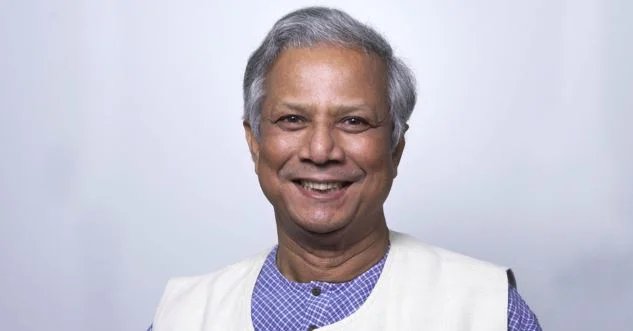
Muhammad Yunus Net Worth and Bio of Microcredit Pioneer
Muhammad Yunus is a Bangladeshi social entrepreneur, banker, and economist renowned for his pioneering work in microfinance and his role in founding the Grameen Bank. Born on June 28, 1940, in Chittagong, Bangladesh, Yunus has dedicated his life to alleviating poverty through innovative financial solutions. His efforts have earned him numerous accolades, including the Nobel Peace Prize in 2006. Yunus’s work has had a profound impact on millions of lives worldwide, and his contributions to social business continue to influence global economic and philanthropic practices.
Muhammad Yunus Net Worth
| Category | Richest People |
|---|---|
| Net Worth | $30 million. |
| Birthdate | June 28, 1940 |
| Birthplace | Chittagong, Bangladesh |
| Profession | Bangladeshi Entrepreneur, Banker, and Economist |
| Height | 5’9″ / 179cm |
| Weight | 171lbs /78kg |
As of 2024, Muhammad Yunus’s net worth is estimated to be around $30 million. This substantial figure reflects his success and influence as a social entrepreneur, speaker, and author. Yunus’s financial standing is a testament to his impactful career and the broad recognition of his contributions to social business and microfinance.
Muhammad Yunus Sources of Income
A significant portion of Yunus’s net worth is derived from his pioneering work in social entrepreneurship. As the founder of Grameen Bank, Yunus’s innovative approach to microfinance has not only revolutionized the field but has also brought substantial financial success. His role in various social enterprises and initiatives has contributed to his wealth, showcasing the financial viability of social business models.
Muhammad Yunus Speaking Engagements
Yunus is also a sought-after speaker, participating in numerous international conferences, seminars, and lectures. His speeches on microfinance, social entrepreneurship, and poverty alleviation attract high-profile engagements, which contribute to his overall income. These speaking engagements not only enhance his net worth but also amplify his influence in global discussions on social change.
Muhammad Yunus Authorship
As an author, Muhammad Yunus has penned several influential books on social business and microfinance. His publications, including “Banker to the Poor” and “Building Social Business,” have been widely acclaimed and contribute to his financial portfolio. Royalties from these books, along with his contributions to academic and popular literature, add to his wealth.
Muhammad Yunus Investments and Advisory Roles
Yunus’s financial resources are further supplemented by his investments in various social enterprises and startups. These investments align with his mission of creating social impact and contribute to his overall net worth. By investing in businesses that aim to solve social issues, Yunus not only supports innovative solutions but also benefits financially from their success.
Muhammad Yunus Advisory Roles
In addition to his direct entrepreneurial activities, Yunus is involved in numerous advisory roles for organizations and initiatives focused on social impact and economic development. These roles often come with compensation, further enhancing his net worth. His expertise and reputation make him a valuable advisor, contributing to his financial and professional success.
Muhammad Yunus Commitment to Social Impact
Despite his considerable wealth, Muhammad Yunus remains deeply committed to his mission of eradicating poverty. His substantial net worth is used to fund various social impact projects and initiatives. Yunus continues to channel his resources into efforts that align with his vision of creating a more equitable and just world. He leverages financial success for the greater good, as reflected in his dedication to social change. His ongoing efforts underscore his commitment to making a positive difference in society.
Muhammad Yunus Early Life and Education
Muhammad Yunus was born on June 28, 1940, in Chittagong, a vibrant port city in southeastern Bangladesh. Raised in a modest household, Yunus’s early years were marked by the challenges and constraints typical of a lower-middle-class family in a developing country. His father, a jeweler, and his mother, a homemaker, instilled in him the values of hard work and education. Despite limited resources, Yunus’s family emphasized the importance of learning and perseverance, which significantly influenced his future endeavors.
Muhammad Yunus Undergraduate Studies
Muhammad Yunus’s academic journey began at Dhaka University, one of Bangladesh’s premier institutions. There, he pursued a Bachelor’s degree in Economics, which laid the foundation for his future career. While at Dhaka University, Yunus developed a keen interest in economic theories and their applications. His exposure to the socio-economic challenges faced by his country further fueled this interest. His undergraduate studies not only provided him with a strong theoretical background but also sparked his passion for addressing economic disparities.
Muhammad Yunus Graduate Studies in the United States
Upon completing his undergraduate education, Yunus sought to broaden his academic horizons by pursuing graduate studies in the United States. In 1961, he earned a Master’s degree in Economics from Vanderbilt University in Nashville, Tennessee. This period was pivotal for Yunus as it introduced him to new economic paradigms and research methodologies. His time at Vanderbilt University helped refine his analytical skills and deepen his understanding of economic systems.
Following his Master’s degree, Yunus continued his academic journey at the University of Chicago, where he obtained a Ph.D. in Economics. At Chicago, he was exposed to a diverse range of economic theories and practices, including innovative ideas on development economics and social welfare. The rigorous academic environment and the opportunity to engage with leading economists of the time significantly influenced his perspective on economic development and poverty alleviation.
Muhammad Yunus Influence on Career and Innovations
The combination of his education at Dhaka University, Vanderbilt University, and the University of Chicago played a crucial role in shaping Yunus’s approach to social entrepreneurship. The knowledge and skills he acquired during his studies enabled him to critically evaluate existing economic models and develop his own innovative solutions to address poverty. His academic background provided the theoretical underpinning for his later work with Grameen Bank and his contributions to microfinance, which have had a lasting impact on global economic practices.
Muhammad Yunus Career and Achievements
Muhammad Yunus transformed his career when he returned to Bangladesh in the 1970s and encountered the widespread poverty affecting millions. Observing the dire economic conditions, Yunus became increasingly determined to find a solution. His initial efforts led to a groundbreaking experiment in 1976, where he provided small loans to impoverished individuals in rural Bangladesh. This experiment revealed the potential of microfinance to empower the poor by offering them access to capital without requiring traditional collateral. The success of this initiative laid the foundation for the creation of Grameen Bank in 1983.
Grameen Bank’s innovative model fundamentally altered the landscape of microfinance. It introduced the concept of group lending, where individuals within a community collectively guarantee each other’s loans. This approach minimized the risk of default and fostered a sense of communal responsibility. The bank’s success demonstrated that the poor could be creditworthy, challenging conventional financial systems that often excluded them. Yunus’s pioneering work not only revolutionized microfinance but also inspired similar initiatives worldwide. His approach has been instrumental in expanding financial inclusion and has earned him global recognition as a leading advocate for social business and poverty reduction.
Muhammad Yunus Nobel Peace Prize
In 2006, Muhammad Yunus and Grameen Bank were awarded the Nobel Peace Prize, a prestigious accolade that highlighted their contributions to global development and peace. The Nobel Committee recognized Yunus for his innovative approach to microfinance, which aimed to alleviate poverty and promote economic self-sufficiency. By providing small loans to the poor without requiring collateral, Yunus created a model that demonstrated how financial inclusion could lead to social and economic development. The Nobel Prize not only celebrated Yunus’s achievements but also brought international attention to the potential of microfinance as a tool for sustainable development.
The award underscored the impact of Yunus’s work in transforming the lives of millions by empowering them economically. It also emphasized the role of microfinance in fostering peace by addressing the root causes of poverty and inequality. The recognition from the Nobel Committee elevated Yunus’s status as a global leader in social entrepreneurship and highlighted the broader implications of his work for addressing global challenges. This acknowledgment of his efforts helped to further the cause of microfinance and inspired continued innovation and investment in social business solutions.
Muhammad Yunus Personal Life
Muhammad Yunus’s personal life reflects his deep commitment to the values he advocates in his professional work. He married twice and has a daughter from his first marriage. Yunus intertwines his personal and professional lives, showing his dedication to social causes in both areas. Known for his modest lifestyle, Yunus lives a life marked by simplicity and purpose, aligning his personal choices with his broader mission of poverty alleviation and social justice.
Yunus’s engagement in philanthropy and community development extends beyond his work with Grameen Bank. He actively participates in various initiatives aimed at fostering social change and addressing inequality. Yunus exemplifies a strong sense of responsibility and a drive to make a positive impact on society in his personal life. He continuously advocates for and implements solutions to improve the lives of the underprivileged, reflecting his commitment to social causes. His personal values clearly reinforce his professional achievements.
Muhammad Yunus Future Prospects
Muhammad Yunus’s influence in social business and microfinance remains significant as he continues to address pressing global challenges. His vision for a world free of poverty and inequality drives his ongoing work in promoting social entrepreneurship. Yunus actively develops new models for social business to tackle issues like climate change, education, and health care. These initiatives often involve partnerships with governments, NGOs, and private sectors to scale innovative solutions and enhance their impact. By leveraging his extensive experience and network, Yunus is pushing the boundaries of how microfinance and social business can address contemporary problems and create sustainable development.
Looking ahead, Yunus’s work is likely to continue shaping the landscape of social impact and economic development. He creates a new standard for business models by developing a “social business” paradigm, where enterprises address societal issues while staying financially self-sustainable. As global challenges evolve, Yunus’s approach will likely adapt, influencing how businesses and organizations address issues such as social exclusion and economic disparity. His ongoing projects and advocacy efforts ensure that his impact will extend well into the future, potentially inspiring new generations of social entrepreneurs and changemakers.
Conclusion
Muhammad Yunus’s journey from a young economist to a globally recognized Nobel laureate exemplifies the transformative power of innovative thinking. His pioneering work in microfinance has provided financial resources to millions and revolutionized the way we address poverty. Through the Grameen Bank and his various social business ventures, Yunus has demonstrated that economic self-sufficiency and social impact can go hand in hand. His contributions have set a high standard for social entrepreneurship and have become a model for tackling global issues through innovative financial solutions.
As Yunus continues to lead and inspire, his legacy is expected to endure and expand. His dedication to creating positive change and promoting economic justice will influence future generations and shape global efforts towards a more equitable world. By continuously pushing the boundaries of what is possible in social business, Yunus ensures that his impact will resonate for years to come, contributing to a more just and inclusive society. His life and work remain a testament to the potential for individuals to effect meaningful and lasting change.



